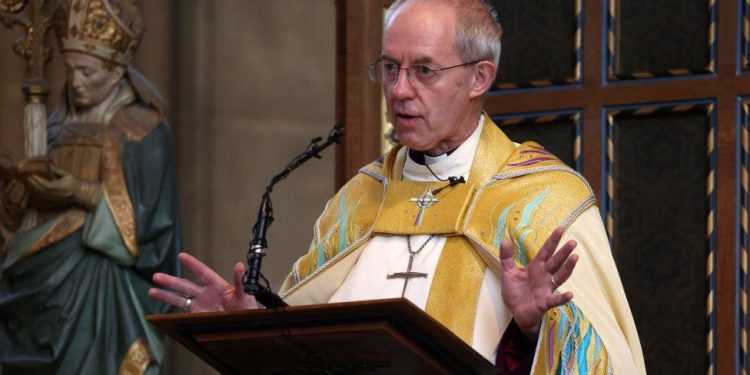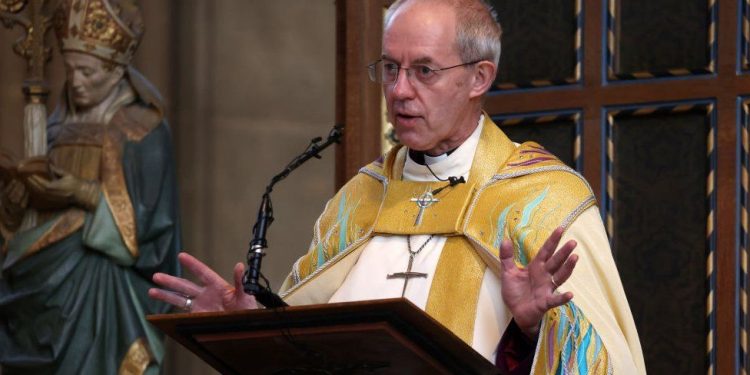Archbishop of Canterbury Sparks Controversy with Explosive Comments on Gay Sex and the Church’s Moral Compass

In a stunning and candid moment that has sent shockwaves through the Church of England and beyond, Archbishop of Canterbury Most Rev Justin Welby ignited a fierce debate following his appearance on the Leading podcast with Rory Stewart and Alistair Campbell. Welby, the spiritual leader of the worldwide Anglican Communion, made eyebrow-raising remarks when asked whether he believed gay sex was sinful—a question that has deeply divided the Church for decades.

Speaking with a tone of careful reflection, Welby admitted he had a “better answer” than when he was first posed the same question by Campbell in a 2017 GQ interview. However, his response this time was no less contentious. In what some view as a pivotal shift in the Church’s moral stance, Welby emphasised that the focus should be on “stable, committed, and faithful relationships,” whether heterosexual or homosexual. This nuanced answer has left both supporters and detractors grappling with the implications for the Church’s teachings on marriage, sexuality, and morality.
“Where we (the Church) have come to is to say that all sexual activity should be within a committed relationship, whether it’s straight or gay. We’re not giving up on the idea that sex is within marriage or civil partnership. We’ve put forward a proposal that where people have been through a civil partnership or a same-sex marriage under the 2014 Act, they should be able to come to a church for a service of prayer and blessing.”
A Shifting Moral Landscape: The Archbishop’s Evolution
Archbishop Justin’s comments represent the clearest and most direct statement yet of his evolving views on the issue of sexuality. He stated that all sexual activity—whether between straight or gay couples—should occur within the bounds of a committed relationship, such as marriage or civil partnership. Importantly, Welby’s proposal allows for same-sex couples, married under the 2014 law, to seek blessings in the church, marking a significant departure from the traditional stance that confines sexual intimacy strictly to heterosexual marriage.
Welby’s remarks, while measured, have been interpreted by many as signalling an acceptance of sexual relationships outside of the confines of marriage. Critics have swiftly condemned the archbishop, asserting that his comments undermine biblical teachings on the sanctity of marriage and sexual purity. The conservative wing of the Church of England, in particular, has voiced concern that Welby’s position diverges sharply from the foundational doctrines that the Church has upheld for centuries.
A Divided Church: Critics and Backlash
The backlash was swift and fierce. Traditionalists within the Church argue that the Archbishop’s remarks not only blur the lines between right and wrong but also risk sowing confusion among the faithful. According to them, the Prayers of Love and Faith (PLF), introduced in February 2023, were not meant to imply an endorsement of sexual activity outside of marriage. Critics argue that the Archbishop’s personal views, no matter how sincere, cannot be allowed to redefine the Church’s theological stance on sexuality.
“There is a clear biblical precedent on this matter,” said one prominent conservative bishop, who asked to remain anonymous. “Sex is a gift from God that is meant to be expressed within the sanctity of marriage—between a man and a woman. To imply otherwise is to undermine the very fabric of Christian teaching.”
Many in the conservative camp are calling for Welby to step down, claiming that a leader who no longer upholds these core doctrines cannot, in good conscience, continue to lead the Church. For these critics, the Archbishop’s comments reflect not only a departure from Scripture but also an erosion of the moral authority of the Church in an increasingly secular world.
Lambeth Palace Responds: A Personal View or Institutional Shift?
In response to the firestorm, Lambeth Palace sought to douse the flames with a statement clarifying that Welby’s comments represented his personal views and not the official stance of the Church of England. The Palace emphasized that the Archbishop’s thinking had evolved over time, largely through theological reflection and engagement with the Living in Love and Faith process—a Church-wide initiative aimed at navigating issues of sexuality and relationships in a modern world.
The statement pointed out that while the Archbishop’s views align with those of the Archbishop of York and many other bishops, they are not the definitive position of the Church. However, the clarification did little to quell the controversy, as many argue that the head of the Church voicing such a position on a divisive issue is tantamount to an institutional shift.
A Church at a Crossroads
This controversy comes at a crucial time for the Church of England, as the House of Bishops prepares to meet to discuss the next steps in the Living in Love and Faith process. With divisions between progressives and conservatives growing ever wider, Welby’s remarks risk exacerbating tensions within a Church that is already deeply divided over issues of sexuality, marriage, and modern morality.
Welby’s comments also arrive at a moment when the global Anglican Communion, of which he is the titular leader, is grappling with similar questions. In several parts of the Communion, including much of Africa and Asia, conservative views on homosexuality and marriage are prevalent, and Welby’s stance may create further fractures between the Church of England and its international counterparts.
The Broader Implications: Church, Culture, and the Modern World
What is particularly striking about this latest episode is not just the theological implications, but also what it says about the broader cultural landscape in which the Church operates. The Archbishop’s remarks appear to reflect a growing tension between traditional Christian values and a modern society that increasingly values inclusion, diversity, and acceptance—particularly for LGBTQ+ individuals.
For many, Welby’s words are seen as a necessary and compassionate response to the realities of modern relationships. Yet, for others, they represent a dangerous compromise that threatens to dilute the core tenets of Christian faith. As the Church of England continues to navigate this delicate and divisive issue, it faces a difficult choice: whether to cling to tradition or adapt to an evolving world.
Final Thoughts: A Moment of Reckoning
The controversy surrounding Archbishop Justin Welby’s comments is more than just a theological debate; it is a moment of reckoning for the Church of England. As it faces mounting pressure from both within and outside its walls, the Church must decide whether to embrace change or reaffirm its historical teachings. Either way, Welby’s words have undoubtedly triggered a critical conversation about the future of the Church, its moral authority, and its place in an increasingly secular society. Whether this will lead to healing or further division remains to be seen.
For now, the Archbishop’s comments have sparked a fire that will not easily be extinguished.




